From songs and lyrics to the people who shaped her story, these 100 Taylor Swift-inspired baby names offer the ultimate list for Swifties naming their future superstar.
Girl names that start with D have a complicated history in the United States.
In its heyday, the letter “D” was holding it down as the No. 1 most popular first initial for girls every year between 1952 and 1960, according to Behind the Name.
In that sense, the 1950s was the “golden age” of girl names starting with D.
RELATED: These banned baby names and wild baby-naming laws will leave you speechless!
But fast forward to today and D girl names aren’t doing so well.
The letter “d” fell as far back as 16th (out of 26) for first initials in 2016 and has now ranked 14th two years in a row dating back to 2023 — proving a lot can change over the course of six decades.
And data from the Social Security Administration (SSA) backs that up.
Of the 100 most popular girl names of the 1950s, when the letter “d” was peaking, 10 of them were girl names that start with D — and five of them ranked inside the top 50:
| 5. Deborah (430,541 baby girls) | 54. Debbie (82,099 baby girls) |
| 7. Debra (341,347 baby girls) | 55. Diana (80,235 baby girls) |
| 10. Donna (270,333 baby girls) | 58. Dorothy (74,476 baby girls) |
| 17. Diane (210,627 baby girls) | 71. Darlene (61,886 baby girls) |
| 26. Denise (123,783 baby girls) | 100. Doris (42,897 baby girls) |
Those 10 names accounted for more than 1.7 million of the nearly 20 million baby girls born in the United States in the 1950s, according to the SSA.
Yet, they were nowhere to be found in the SSA’s top-100 most popular girl names of 2024. In fact, the only two D girl names to crack the top-100 last year were Delilah (50th) and Daisy (76th).
In hopes of spurring a comeback, here are some D names for girls that could use a little love today!
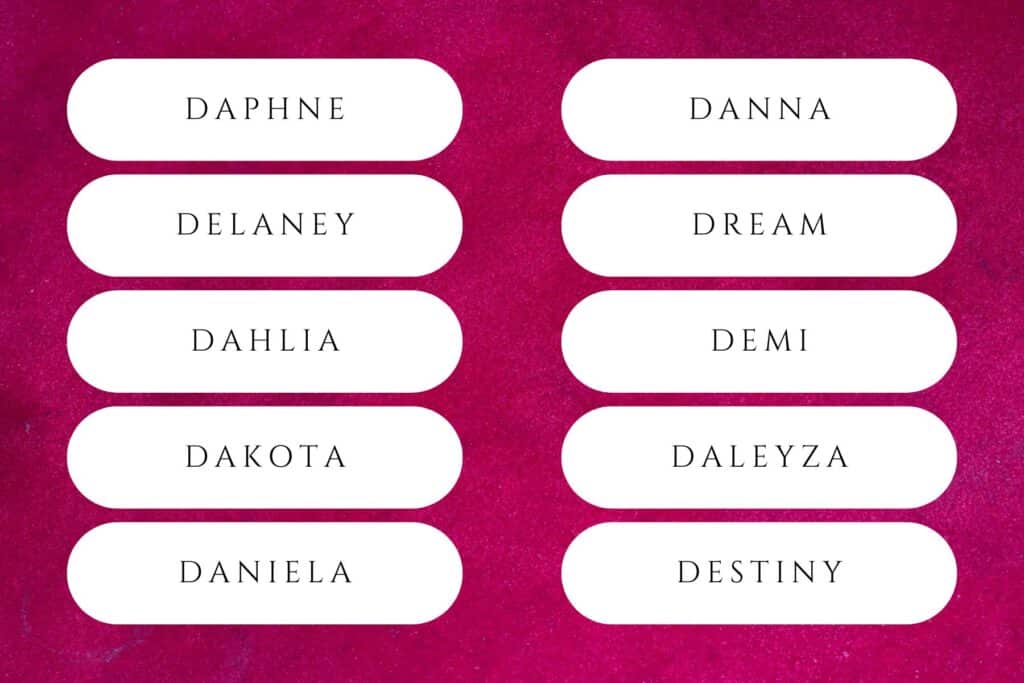
Daphne
Origin: Greek
Meaning: Laurel
Daphne, pronounced DAF-nee, comes directly from the Greek word daphne, meaning “laurel.” In Greek mythology, Daphne is a Naiad-nymph who was turned into a laurel tree to escape the pursuit of Apollo.
Delaney
Origin: Norman French; Old Irish
Meaning: From the alder grove; Dark defiance
Delaney, pronounced duh-LAY-nee, either derives from the Norman French phrase de l'aunaie, meaning "from the alder grove,” or the Old Irish name Dubhshláine, meaning “dark defiance” or “black challenge.”
Dahlia
Origin: Latin; Swedish; Old Norse
Meaning: Dahl’s flower; Flower valley
Dahlia, pronounced duh-LEE-uh or DAH-lee-uh, comes directly from the name of the flower, which was named after the Swedish botanist Anders Dahl. His last name derives from the Old Norse word dalr, meaning “valley.”
Dakota
Origin: Native American
Meaning: Friendly; Native American people
Dakota, pronounced duh-KOH-tuh, comes from the name of the two American states North Dakota and South Dakota, which were named after a group of native peoples from the American plains. The name means “friendly” in the Dakota language.
Daniela
Origin: Hebrew
Meaning: God is my judge; God’s judge
Daniela, pronounced dan-YEL-uh, is the feminine form of Daniel, which comes from the Hebrew name Daniyyel and is composed of the Hebrew elements din, meaning “to judge,” and el, meaning “God.”
Danna
Origin: Hebrew; Persian
Meaning: God’s judge; God is my judge; Wise
Danna, pronounced DAN-uh, is a variant of Dana, which is the feminine form of Dan and Daniel, and is composed of the Hebrew elements din, meaning “to judge,” and el, meaning “God.” It could also derive from the Persian word dānā, meaning “wise.”
Dream
Origin: English
Meaning: Mental images while sleeping
Dream, pronounced DREEM, comes from the English word dream, referring to the series of thoughts, images, and sensations that occur in the mind during sleep. In Old English, dream meant “joy” and “music.”
Demi
Origin: Greek; French
Meaning: Earth mother; Goddess of agriculture; Half
Demi, pronounced DEH-mee, is often used as a nickname for Demetria and Demeter, meaning “earth mother.” In Greek mythology, Demeter is the goddess of agriculture. In French, demi means “half.”
Daleyza
Origin: Italian; Latin
Meaning: Delightful; Pleasure
Daleyza, pronounced duh-LAY-zuh or duh-LEE-zuh, is believed to derive from the Italian word delizia and Latin word deliciae, meaning “delightful” or “pleasure.” It’s also considered an elaborate form of Dahlia.
Destiny
Origin: English; Old French; Latin
Meaning: Destiny; Fate
Destiny, pronounced DEH-stuh-nee, comes directly from the English word destiny (derived from Old French destinée and Latin destino), meaning “fate” or “the irresistible tendency of certain events to come about.”
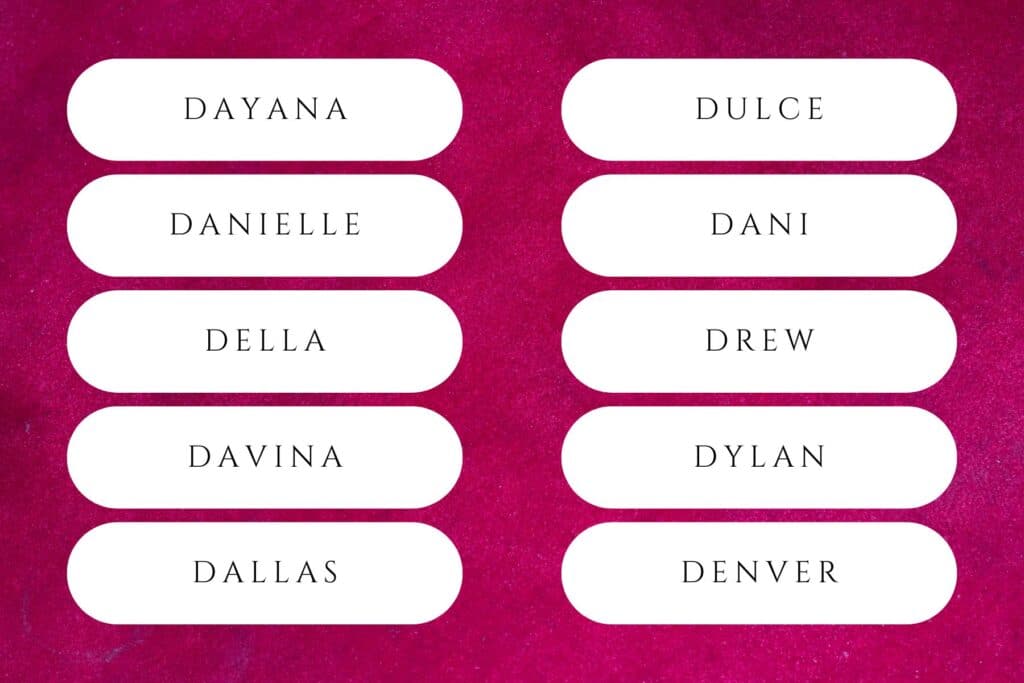
Dayana
Origin: Latin; Roman
Meaning: Divine; God-like
Dayana, pronounced DYE-an-uh, is a variant of Diana, which derives from the Latin word dia or diva, meaning “divine” or “god-like.” Other unique variants of Diana include Dianna, Deanna and Diane.
Danielle
Origin: Hebrew
Meaning: God is my judge; God’s judge
Danielle, pronounced DAN-yell, is the French feminine form of Daniel, which comes from the Hebrew name Daniyyel and is composed of the Hebrew elements din, meaning “to judge,” and el, meaning “God.”
Della
Origin: Germanic
Meaning: Noble type; Noble kind
Della, pronounced DEL-uh, is a shortened form of Adela, which derives from the Germanic element adal, meaning “noble,” or a diminutive of Adelaide, which is composed of the Germanic adal and heit, meaning “type.”
Davina
Origin: Scottish; Hebrew
Meaning: Beloved; Uncle
Davina, pronounced duh-VEE-nuh, is a feminine form of David that originated in Scotland. David comes from the Hebrew name Dawid, which derives from the Hebrew word dod, meaning “beloved” or “uncle.”
Dallas
Origin: American; Old English; Gaelic
Meaning: Valley house; Meadow dwelling; City in Texas
Dallas, pronounced DAL-iss, comes directly from the name of the city in Texas, which is believed to be named after former Vice President George M. Dallas and either means “valley house” in Old English or “meadow dwelling” in Gaelic.
Dulce
Origin: Spanish
Meaning: Candy; Sweet
Dulce, pronounced DUHL-chay or DOOL-say, comes directly from the Spanish word dulce, meaning “candy” or “sweet.” It was popularized by Mexican singer Dulce, who passed away in December 2024.
Dani
Origin: Hebrew
Meaning: God’s judge; God is my judge
Dani, pronounced DAN-ee, is a diminutive of Danielle and Daniel, which comes from the Hebrew name Daniyyel and is composed of the Hebrew elements din, meaning “to judge,” and el, meaning “God.”
Drew
Origin: English; Greek
Meaning: Manly; Masculine
Drew, pronounced DROO, is a shortened form of Andrew, which comes from the Greek name Andreas and derives from the Greek word andreios, meaning “manly” or “masculine,” and aner, meaning “man.”
Dylan
Origin: Welsh
Meaning: Born of the sea; Son of the sea
Dylan, pronounced DIL-ihn, comes from Welsh mythology where Dylan was a sea god. The name ultimately derives from Welsh elements dy, meaning “to” or “toward,” and llanw, meaning “tide” or “flow.”
Denver
Origin: American; Old English
Meaning: Dane ford; Capital city of Colorado
Denver, pronounced DEN-ver, comes directly from the name of the capital city of Colorado, which was named after politician James W. Denver. The name is believed to mean “Dane ford” in Old English.
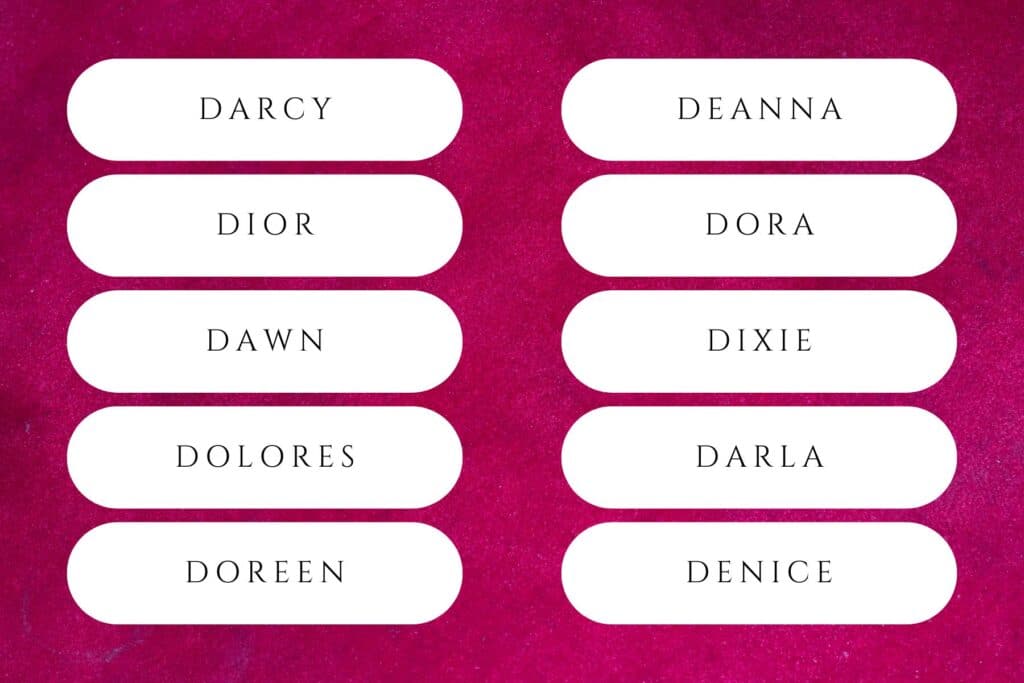
Darcy
Origin: Norman French
Meaning: From Arcy; Of Arcy
Darcy, pronounced DAHR-see, comes from the Norman French phrase d’Arcy, meaning “from Arcy” or “of Arcy,” with Arcy being a town in La Manche, France. Arcy is located in the Normandy region of France.
Dior
Origin: French
Meaning: Golden; Fashion house
Dior, pronounced DEE-ohr, is believed to derive from the French word doré, meaning “golden.” It was popularized internationally by the French luxury fashion house Dior, founded by designer Christian Dior.
Dawn
Origin: English
Meaning: Morning; First light
Dawn, pronounced DAWN, comes directly from the English word dawn (derived from Old English dagung), meaning “to become day.” Dawn refers to the first appearance of light in the sky before sunrise.
Dolores
Origin: Latin; Spanish
Meaning: Sorrow
Dolores, pronounced duh-LOHR-iss, comes from the Latin word dolor, meaning “sorrow.” It’s used in the Spanish title of the Virgin Mary, Nuestra Señora de los Dolores, which means “Our Lady of Sorrows.”
Doreen
Origin: Greek; Old Irish
Meaning: Gift; Sullen
Doreen, pronounced DOHR-een, derives from the Greek word doron, meaning “gift.” It’s the same Greek element found in the names Dorothy, Theodora and Isadora. It can also derive from the Old Irish word doireann, meaning “sullen.”
Deanna
Origin: Latin; English
Meaning: Divine; God-like; Valley; College leader
Deanna, pronounced dee-AN-uh, is either used as a variant of Diana, which derives from the Latin word dia or diva, meaning “divine” or “god-like,” or a feminine form of Dean, meaning “valley” or “head of university.”
Dora
Origin: Greek
Meaning: Gift
Dora, pronounced DOHR-uh, derives from the Greek word doron, meaning “gift,” and is often used as a shortened form of names starting with Dor, such as Dorothy, or ending with dora, such as Theodora and Isadora.
Dixie
Origin:
Meaning: Southern-born; Ten; I have spoken
Dixie, pronounced DIKS-ee, is a nickname for all or part of the Southern United States. The name is believed to derive from the French word dix, meaning “ten,” or the Latin word dixi, meaning “I have spoken.”
Darla
Origin: English
Meaning: Beloved; Dearly loved
Darla, pronounced DAHR-luh, is a variant of Darlene, which is believed to come from the English word darling (derived from the Old English word deorling), meaning “beloved” or a “dearly loved person.”
Denice
Origin: French; Greek
Meaning: Follower of Dionysius
Denice, is a variant of Denise, which is a feminine form of Denis and, ultimately, derived from the Greek name Dionysios. In Greek mythology, Dionysios was the god of wine, revelry, fertility and dance.
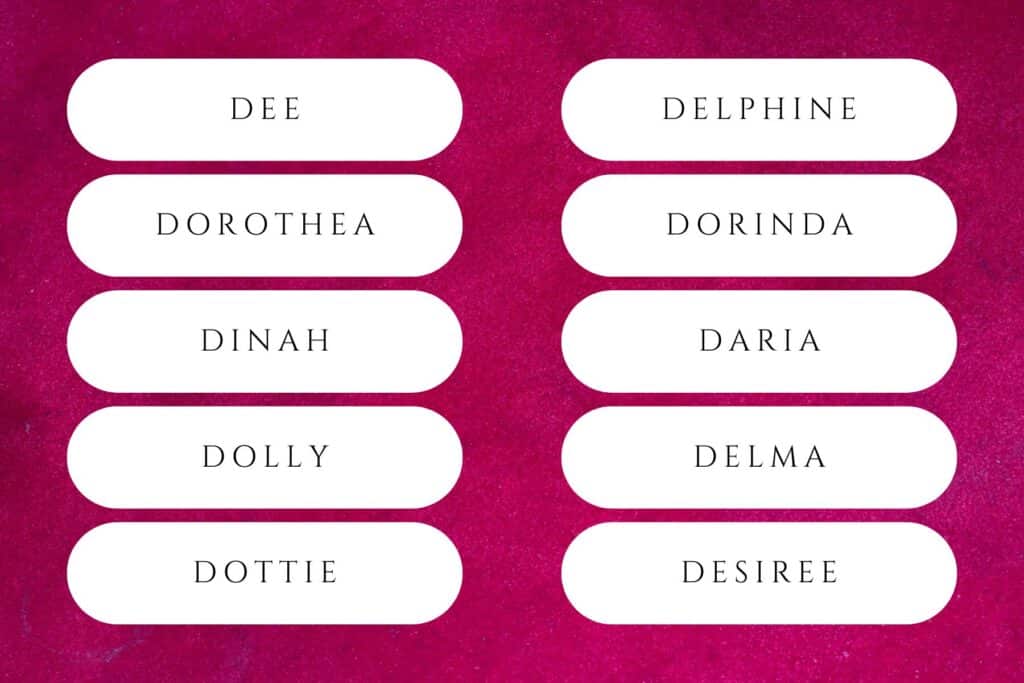
Dee
Origin: Varies
Meaning: Varies
Dee, pronounced DEE, can be used as a nickname for all girl names that start with D. It can also refer to the Dee River, a river in Scotland flowing from the Cairngorm Mountains to the North Sea at Aberdeen.
Dorothea
Origin: Greek
Meaning: Gift of God; God’s gift
Dorothea, pronounced dohr-uh-THEE-uh, comes from the Greek name Dorotheos, which is composed of the Greek elements doron, meaning “gift,” and theos, meaning “god.” It can also be spelled Dorothy.
Dinah
Origin: Hebrew
Meaning: To judge
Dinah, pronounced DYE-nuh or DEE-nuh, comes directly from the Hebrew word din, meaning “to judge” or “be judged.” In the Bible, Dinah was the only daughter of Jacob and Leah, born after their six sons.
Dolly
Origin: Spanish; Greek
Meaning: Sorrow; God’s gift
Dolly, pronounced DAH-lee, is primarily used as a nickname for Dolores, meaning “sorrow” in Spanish, or Dorothy, meaning “God’s gift” in Greek. It was widely popularized in the United States by Dolly Parton.
Dottie
Origin: Greek
Meaning: God’s gift; Gift of God
Dottie, pronounced DAH-tee, is primarily used as a nickname for Dorothy, which comes from the Greek name Dorotheos and is composed of the elements doron, meaning “gift,” and theos, meaning “god.”
Delphine
Origin: Latin; Greek
Meaning: Of Delphi; Womb
Delphine, pronounced DEL-feen, comes from the Latin name Delphinus, meaning “of Delphi,” with Delphi being an ancient city in Greece. It’s possibly derived from the Greek word delphys, meaning “womb.”
Dorinda
Origin: Invented; Greek
Meaning: Gift
Dorinda, pronounced doh-RIN-duh or duh-RIN-duh, is believed to be an elaboration of Dora, meaning “gift” in Greek. One of its earliest known uses was in John Dryden and William D'Avenant 1667 play “The Enchanted Island.”
Daria
Origin: Old Persian
Meaning: Possessively good
Daria, pronounced DAHR-ee-uh, DAIR-ee-uh or duh-REE-uh, is the feminine form of Darius, which is composed of the Old Persian elements daraya, meaning “to possess,” and vau, meaning “good.”
Delma
Origin: Old German
Meaning: My father protects
Delma, pronounced DEL-muh, is believed to be a variant of Adelma and, ultimately, Adhelm, which is composed of the Old German elements atto, meaning "father," and helm, meaning “protection."
Desiree
Origin: English; French; Latin
Meaning: Desired; Wished for
Desiree, pronounced DEH-zuh-ray, comes from the English word desire (derived from Old French desirrer and Latin desiderare), meaning “to wish for.” Other ways to spell this name include Desirae and Deziree.
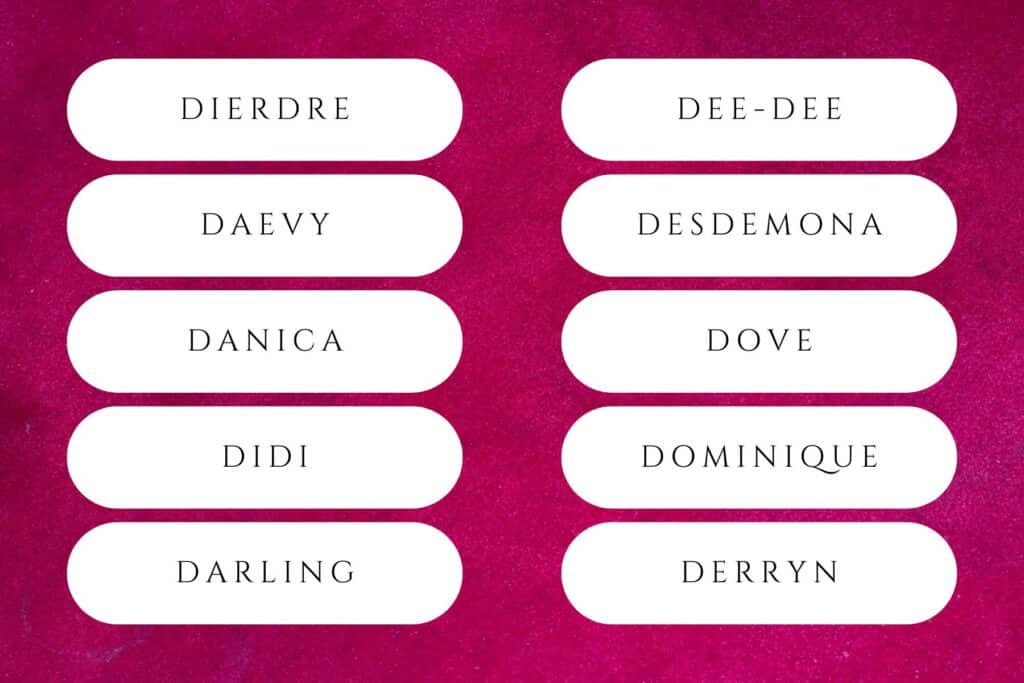
Deirdre
Origin: Old Irish
Meaning: Daughter
Deirdre, pronounced DEER-druh, comes from the Old Irish name Derdriu, which is believed to derive from the Old Irish word der, meaning “daughter.” In Irish legend, Deirdre is a tragic heroine known as "Deirdre of the Sorrows.”
Daevy
Origin: Hebrew; Khmer
Meaning: Beloved; Angel
Daevy, pronounced DAY-vee, is a modern diminutive of David, which comes from the Hebrew name Dawid and derives from the Hebrew word dod, meaning “beloved” or “uncle.” Other theories suggest it means “angel” in Khmer.
Danica
Origin: Slavic
Meaning: Morning star; Venus
Danica, pronounced DAN-ih-kuh, derives from the Slavic word dĭnĭnica, meaning “morning star” or “Venus.” In Slavic folklore, Danica is a personification of the morning star that represents dusk.
Didi
Origin: Varies
Meaning: Varies
Didi, pronounced DEE-dee, doesn’t have one particular meaning. It’s often used as a nickname for names that start with D and can also be spelled Deedee or Dee-dee, if you like hyphenated baby girl names.
Darling
Origin: English
Meaning: Beloved one; Favorite
Darling, pronounced DAHR-ling, comes directly from the English word darling (derived from Old English deorling and dyrling), meaning “one who is much beloved” or “a favorite.” It’s often used as a nickname.
Dee-Dee
Origin: Varies
Meaning: Varies
Dee-Dee, pronounced DEE-dee, doesn’t have one particular meaning, as it’s often used as a nickname for girl names that start with D. It can also be a good nickname for someone with D.D. as their initials.
Desdemona
Origin: Greek
Meaning: Ill-fated
Desdemona, pronounced DEZ-dih-moh-nuh, comes from the Greek word dysdaimon, meaning “ill-fated.” It was popularized by William Shakespeare, who named Othello’s wife Desdemona in the hit 1603 play.
Dove
Origin: English
Meaning: White bird
Dove, pronounced DUV, comes directly from the English word for the white bird, ultimately derived from the Middle English word douve. Doves primarily symbolize peace, love, hope, and new beginnings.
Dominique
Origin: Latin
Meaning: Of the Lord; Belonging to the Lord
Dominique, pronounced DAH-muh-neek, is a feminine form of Dominic and Dominicus, which means “of the Lord” in Latin. Saint Dominic was the founder of the Dominican Order and patron saint of astronomers and natural scientists.
Derryn
Origin: Unknown
Meaning: Gift; From Airelle
Derryn, pronounced DAIR-in, is of unknown origin, but could be linked to the Greek word doron, meaning “gift.” Other theories link it to the name Darren or Darrell, which means “from Airelle” in Norman French.
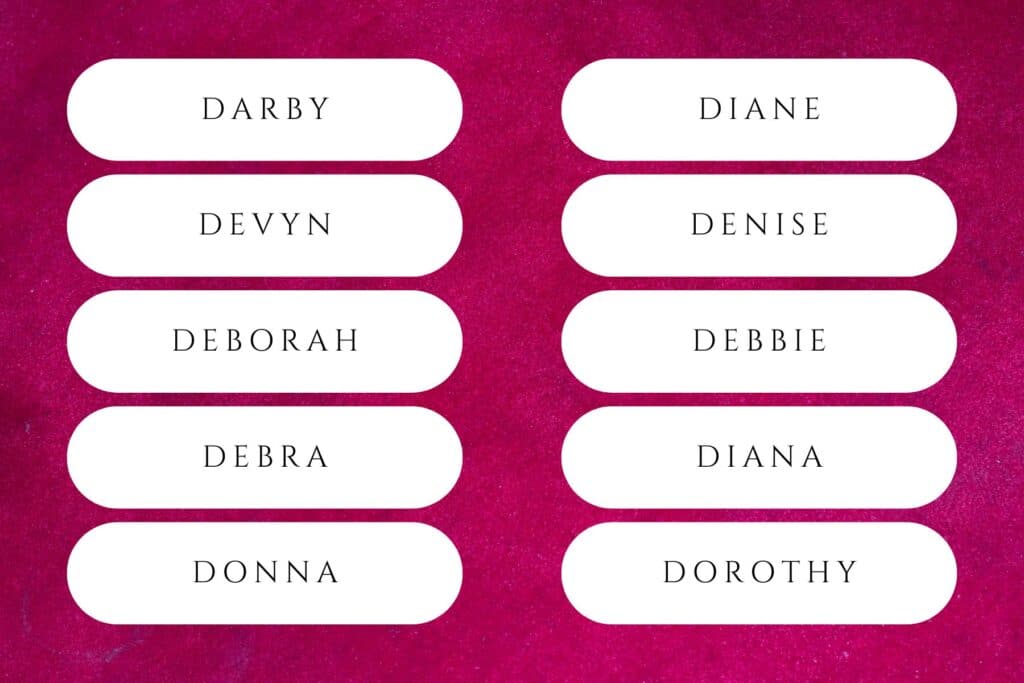
Darby
Origin: English; Old Norse
Meaning: Animal farm; Animal town
Darby, pronounced DAHR-bee, originated as an English place name (in the East Midlands of England) derived from the Old Norse words djúr, meaning "animal," and býr, meaning "farm” or “settlement.”
Devyn
Origin: English; French
Meaning: God-like; Divine
Devyn, pronounced DEH-vin, is a variant of Devin, which is believed to come from the Old French word devin, meaning “divine” or “god-like.” In English, divine means “of, relating to, or proceeding directly from God.”
Deborah
Origin: Hebrew
Meaning: Bee
Deborah, pronounced duh-BOHR-uh or DEB-uh-ruh, comes from the Hebrew name Devora, which means “bee” in Hebrew. In the bible, Deborah is a judge, as well as one of the five female prophets.
Debra
Origin: Hebrew
Meaning: Bee
Debra, pronounced DEB-ruh, is a shortened form of Deborah, which comes from the Hebrew name Devora, which means “bee” in Hebrew. Other variants include Debs, Debby, Debbey, DeeDee and Debrah.
Donna
Origin: Italian; Irish
Meaning: Lady; Ruler of the World
Donna, pronounced DAH-nuh, comes directly from the Italian word donna, meaning “lady.” It can also be used as a diminutive, nickname or feminine form of Donald, which means “ruler of the world” in Irish.
Diane
Origin: French; Latin
Meaning: Goddess
Diane, pronounced DYE-an, is the French form of Diana, which derives from the Latin word diva or dia, meaning “goddess.” In Roman mythology, Diana is the goddess of the hunt, wild animals and childbirth.
Denise
Origin: French; Greek
Meaning: Follower of Dionysus
Denise, pronounced duh-NEES, is the French feminine of Denis, which comes from the Greek name Dionysos and is composed of the Greek elements Dios, meaning “Zeus,” and Nysa, an ancient Greek region.
Debbie
Origin: English; Hebrew
Meaning: Bee
Debbie, pronounced DEH-bee, is a diminutive of Deborah, which comes from the Hebrew name Devora, meaning “bee” in Hebrew. In the bible, Deborah is a judge, as well as one of the five female prophets.
Diana
Origin: Latin
Meaning: Goddess
Diana, pronounced DYE-an-uh, derives from the Latin word diva or dia, meaning “goddess.” In Roman mythology, Diana is the goddess of the hunt, wild animals, the moon, the wilderness and childbirth.
Dorothy
Origin: English; Greek
Meaning: Gift of God; God’s gift
Dorothy, pronounced DOHR-uh-thee or DOHR-thee, is a variant of Dorothea, which comes from the Greek name Dorotheos and is composed of the Greek elements doron, meaning “gift,” and theos, meaning “god.”
Darlene
Origin: English
Meaning: Beloved one; Favorite
Darlene, pronounced DAHR-leen, is a variant of Darling, which comes directly from the English word darling (from Old English deorling and dyrling), meaning “one who is much beloved” or “a favorite.”
Doris
Origin: Greek
Meaning: Dorian woman; Oceanid nymph
Doris, pronounced DOHR-iss, comes directly from the Greek name Doris, meaning “Dorian woman.” In Greek mythology, Doris is an Oceanid nymph, wife of the sea god Nereus and mother of the Nereids.
Delilah
Origin: Hebrew
Meaning: Delicate; Weak
Delilah, pronounced duh-LYE-luh or duh-LEE-luh, comes from a Hebrew word meaning “delicate” or “weak.” In the Bible, Delilah is the lover of Samson who betrays him by cutting off the source of his power (his hair).
Daisy
Origin: Old English
Meaning: Day eye
Daisy, pronounced DAY-zee, comes from the Old English phrase dægeseage meaning "day's eye," referring to how the flower opens at dawn. The flower is known for its white petals and sunny center.
Demetra
Origin: Greek
Meaning: Earth mother; Goddess of agriculture
Demetra, pronounced duh-MEE-truh, is the Italian and Romanian form of Demeter, which means “Earth mother” in Greek and refers to the goddess of agriculture and Zeus’s sister in ancient Greek mythology.
Deja
Origin: French
Meaning: Already
Deja, pronounced DAY-zhuh, comes directly from the French word deja, meaning “already.” Many American speakers know this word from the French phrase deja vu, meaning “already seen.”
Not Interested In Girl Names That Start With D?

Girl names that start with D aren’t as popular as they once were.
Despite the wide range of options parents have to choose from (including flower names like Daisy and Dahlia, and classic names like Donna and Debra) parents today are more interested in other first initials.
But that’s okay — after all, there are 25 other letters of the alphabet to discover!
In 2024, the most popular first initial was A, which accounted for more than 15% of all names given to baby girls that year. For reference, E came in second at just 8.9%.
The letters M, S and L rounded out the top-five most popular first initials for girls in 2024.
That’s why it’s no surprise to see names like Emma, Amelia, Mia, Sophia, Evelyn, Ava and Sofia all rank inside the Social Security’s top-10 most popular girls names of 2024.
Of course, everyone has different preferences — and that’s where Mod Moms Club comes into play.
ALSO ON MOD MOMS CLUB: The Ultimate List of 4 Letter Names for Girls
Aside from our baby name lists (like the one above), we have an extensive baby name generator that allows you to narrow down a list of baby names based on your own personal preferences, so don’t miss it!












